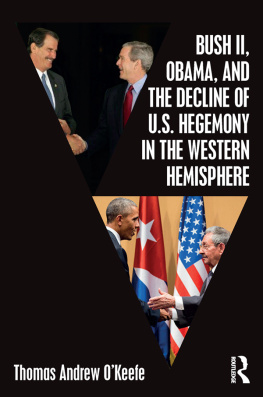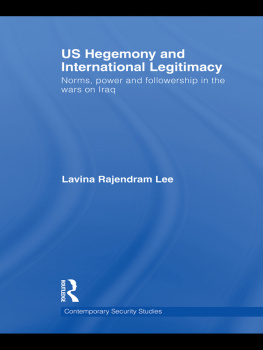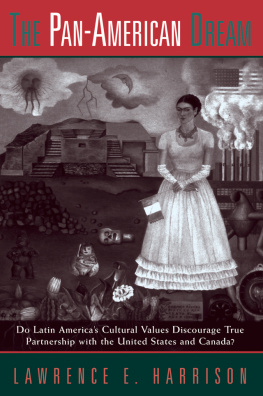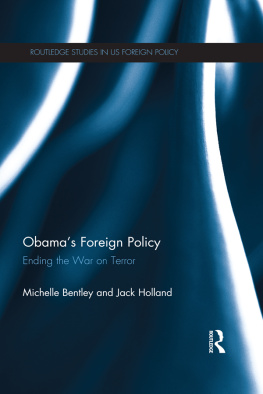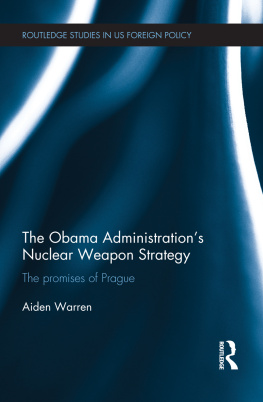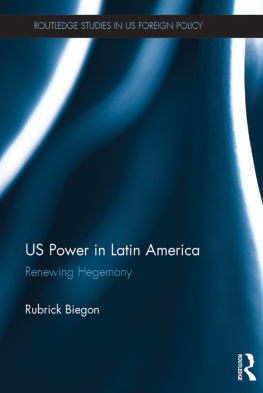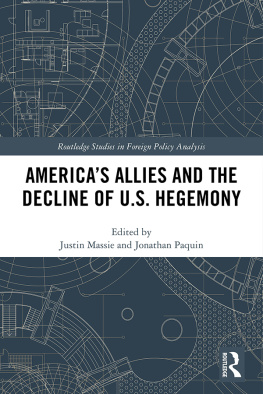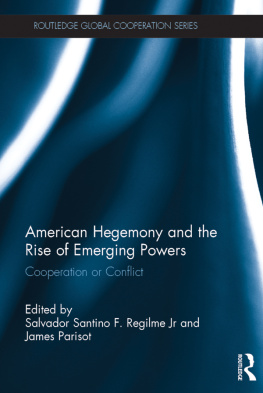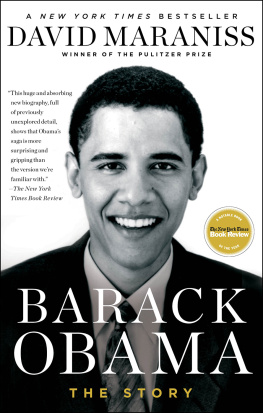Bush II, Obama, and the Decline of U.S. Hegemony in the Western Hemisphere
Bush II, Obama, and the Decline of U.S. Hegemony in the Western Hemisphere applies competing defi nitions and conceptions of hegemony to various foreign policy initiatives and events during the administrations of George W. Bush and Barack H. Obama to test whether they manifest a decline in traditional United States dominance and leadership in the Western Hemisphere. In particular, the book examines the continued relevancy of the inter-American system, the fail-ure to establish a Free Trade Area of the Americas (FTAA), and the stillborn Energy and Climate Partnership of the Americas (ECPA). It also discusses the implications of the Peoples Republic of China becoming a major trading partner and important source of fi nancing and investment capital throughout Latin America and the Caribbean. The book provides critical reviews of Plan Colombia, the Mrida Initiative, Pathways to Prosperity in the Americas, the Central American Regional Security Initiative (CARSI), the Caribbean Basin Security Initiative (CBSI), 100,000 Strong in the Americas , and the restoration of normal U.S. diplomatic relations with Cuba. There are extensive analyses, unusual for a work in English, of the Alianza Bolivariana para los Pueblos de Nuestra Amrica (ALBA), Comunidad de Estados Latinoamericanos y Caribeos (CELAC), and Unin de Naciones Suramericanas (UNASUR).
Thomas Andrew OKeefe has been the President of Mercosur Consulting Group, Ltd. since 1993 and currently teaches at Stanford University. A dual U.S.Chilean national, he has degrees from Columbia University, Villanova Universitys School of Law, and the University of Oxford. The author of numerous books and articles on Latin America and the Caribbean, he chaired the Western Hemisphere Area Studies program at the U.S. State Departments Foreign Service Institute between 2011 and 2016.
Bush II, Obama, and the Decline of U.S. Hegemony in the Western Hemisphere
Thomas Andrew OKeefe
First published 2018
by Routledge
711 Third Avenue, New York, NY 10017
and by Routledge
2 Park Square, Milton Park, Abingdon, Oxon, OX14 4RN
Routledge is an imprint of the Taylor & Francis Group, an informa business
2018 Taylor & Francis
The right of Thomas Andrew OKeefe to be identified as author of this work has been asserted by him in accordance with sections 77 and 78 of the Copyright, Designs and Patents Act 1988.
All rights reserved. No part of this book may be reprinted or reproduced or utilised in any form or by any electronic, mechanical, or other means, now known or hereafter invented, including photocopying and recording, or in any information storage or retrieval system, without permission in writing from the publishers.
Trademark notice:
Product or corporate names may be trademarks or registered trademarks, and are used only for identification and explanation without intent to infringe.
Library of Congress Cataloging-in-Publication Data
Names: OKeefe, Thomas Andrew, 1961- author.
Title: Bush II, Obama, and the decline of U.S. hegemony in the Western Hemisphere / Thomas Andrew OKeefe.
Description: New York, NY: Routledge, 2018. | Includes bibliographical references and index.
Identifiers: LCCN 2017044286 | ISBN 9781138080850 (hbk) | ISBN 9781138080867 (pbk) | ISBN 9781351624299 (epub) | ISBN 9781351624282 (mobipocket/kindle) | ISBN 9781315113197 (ebk)
Subjects: LCSH: United StatesForeign relationsLatin America. | Latin AmericaForeign relationsUnited States. | United StatesForeign relationsCaribbean Area. | Caribbean AreaForeign relationsUnited States. | United StatesForeign relationsCanada. | CanadaForeign relationsUnited States. | Free Trade Area of the Americas (Organization) | Energy and Climate Partnership of the Americas (Organization) | United StatesForeign relations20012009. | United StatesForeign relations20092017.
Classification: LCC F1418.O39 2018 | DDC 327.7308dc23
LC record available at https://lccn.loc.gov/20170442
ISBN: 978-1-138-08085-0 (hbk)
ISBN: 978-1-138-08086-7 (pbk)
ISBN: 978-1-315-11319-7 (ebk)
Typeset in Times New Roman
by Sunrise Setting Ltd, Brixham, UK
In memory of my father Thomas Augustus OKeefe
(19332000) and my mother Rosa Maria
Valenzuela Ferrari (19292010).
Contents
I deeply appreciate the encouragement that my colleagues and friends Annette Hester, Robin King, Barbara Kotschwar, and Carol Wise have extended to me over the years in our mutual quest to create a more economically integrated Western Hemisphere rooted in equity, as well as the intellectual support of decades from Cathy Schneider in deepening my understanding of Latin American politics. I am indebted to Jane Kamide as well, whose retirement offered me the opportunity to get an inside view of how U.S. foreign policy is formulated and implemented while serving as Chair of the Western Hemisphere Area Studies program at the U.S. State Departments Foreign Service Institute between 2011 and 2016. I am also grateful to Stanford University and the trust it has put in me since 2007 to educate its students, and the access it gave me to its rich archival and book collections as well as its data banks and electronic resources, which facilitated writing this book. I especially want to thank the following Stanford University faculty and staff: Rodolfo Dirzo, Herbert Klein, Ivan Jaksic, Adrienne Jamieson, Julie Kennedy, Lynn Orr, Ken Schultz, Stephen Stedman, Megan Gorman, and Elizabeth Senz-Ackermann. Finally, I would be remiss if I did not acknowledge the anonymous reviewer at the Middle Atlantic Council of Latin American Studies (MACLAS) journal, Latin American Essays, who faulted an article I had submitted for publication some years ago for not including a discussion of the different theories of hegemony. Although this omission did not prevent the article from being published, it did serve as the catalyst for me to eventually write this book to remedy that oversight.
Introduction
The genesis for this book is the flurry of discussions in the media and academic circles on the purported decline of U.S. hegemony in the Western Hemisphere that coincided with the start of the twenty-first century. These assertions blossomed following the September 2001 terrorist attacks in the United States, as the administration of George W. Bush concentrated its attention on eliminating Al Qaeda and other extremist Islamist cells in Afghanistan, the Middle East, and Somalia. There was a widespread sentiment that because of this new focus, the United States was ignoring Latin America and the Caribbean. This period also coincided with the election of leftist governments in many Latin American countries that frequently adopted policy positions that were blatantly hostile to the agenda long promoted by Washington, DC. Unlike the response that might have been seen in the past, the United States now seemed to acquiesce to the new status quo in the Americas. This book tests the thesis of whether there has indeed been a decline in the hegemony traditionally exercised by the United States in the Western Hemisphere since at least the end of the nineteenth century.
At the outset, it is important to underscore that this book is about hegemony and not about power per se. Although the United States emerged as the sole superpower after the end of the Cold War, with cumulative economic, military, and other capabilities, preponderant capabilities across the board do not guarantee effective influence in any given arena.1 For one thing, American dominance in the international security arena no longer translates into effective leverage in the international economic arena, as the United States faces rising economic challengers with their own agendas and with greater discretion in international economic policy.2 Accordingly, this book focuses on those international relations theories where the concept of hegemony is a key component for explaining United States foreign policy and actions. It also addresses the conception of hegemony as developed by the Italian sociologist and neo-Marxist Antonio Gramsci. Furthermore, this book does not attempt to wade into the lively debate within the international relations field over which conception of hegemony is more valid, or to propose yet another theory of international relations, for that matter. Instead, its goal is less ambitious. It utilizes existing definitions and notions of hegemony to answer the question of whether its exercise by the United States in Latin America and the Caribbean objectively declined under the administrations of George W. Bush and Barack H. Obama.

